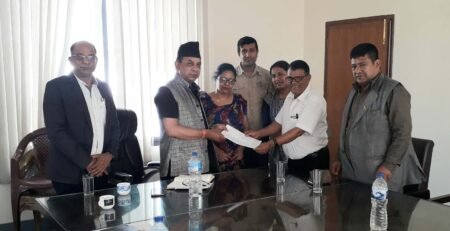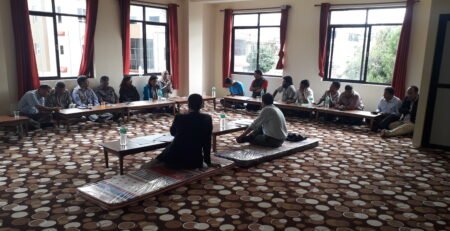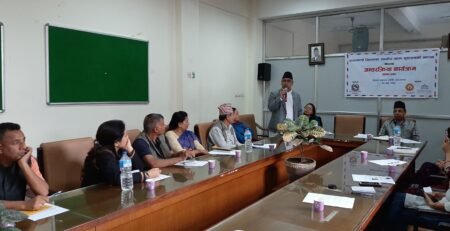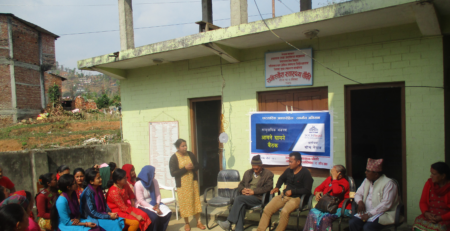Collaboration between Academia and Practice of Sustainable Development
Background
The discussion on the topic ‘Collaboration between Academia and Practice of Sustainable Development’ was jointly organized by Kathmandu University School of Education (KUSOED) Department of Development Education and Society for Humanism (SOCH), Nepal. The discussion took place on June 21, 2020, commencing at 5:00 P.M. and concluded around 7:00 P.M. NST. Four expert panellist; Honorable Dr. Usha Jha, Member of National Planning Commission (NPC), Professor Bhim Prasad Subedi, Chairperson University Grant Commission (UGC), Professor Mahesh Nath Prajuli, Dean Kathmandu University School of Education (KUSOED) and Ms. Latika Maskey, Assistant Representative United Nations Population Fund (UNFPA), were among the speakers. Dr. Prakash C. Bhattarai, Department Head Kathmandu University School of Education Department of Development Education was the moderator of the discussion. Approximately a hundred and fifty participants were connected online to participate in the discussion.
Objective of the Program
The objective of the program was to discuss and address a way out on how academia, i.e., the theoretical knowledge and practitioners practice at ground-level could be collaborated to achieve Sustainable Development Goals (SDGs) adopted by Nepal.
Commencement of the Program
Moderator Dr. Prakash C. Bhattarai started the program at the scheduled time. Along with the opening remarks of thanking and acknowledging panelists, the discussants, the moderator also formally introduced the purpose and objectives of the discussion. He emphasized on a collaborative partnership between all concerned authorities to make the SDG successful. He even briefly introduced the KUSOED Department of Development and the ongoing academic programs at KUSOED along with SOCH humanitarian activities. The moderator also notified the panelist of their allocated time (5/6 minutes) to put their views on the discussion agenda. The first speaker, he invited, was Professor Bhim Prasad Subedi.
Speaker I: Professor Bhim Prasad Subedi
Professor Bhim Prasad Subedi began his talk by explaining the SDG concept in Nepal’s context. He emphasized on combining theoretical knowledge and practical aspect to achieve the SDGs. He mentioned that equity, one of the principal agendas of SDG, has to be discussed widely in the Nepali context. He emphasized the economic and environmental aspects of SDGs. The need for SDG for who, its variations, equity aspects, inter and intra generation equity leading to transformation and development was raised in this speech. His talks were directed towards understanding the country’s legacy. By legacy he meant understanding Nepal’s geography; the river, the Himalayas, and the forest to successfully implement SDGs in Nepal. He ended his talk emphasizing in identifying and discovering resources and understanding the imbalance between resources for the successful implementation of SGD in Nepal.
Speaker II: Honorable Dr. Usha Jha
To address the moderator question of how academia and practice can collaborate, Dr. Jha emphasized that all concerned stakeholders should go hand in hand for effective collaboration to achieve SDG. All involved individuals should acknowledge the presence of each other and go together for the successful implementation of SDG. She stated, out of seventeen SDGs Nepal has adopted sixteen goals, 479 indicators, and 159 targets to be achieved through SDG. She had no hesitation in stating that there is a gap between what is being discussed and what is being practised. Thus, she stated NPC has taken the Multi-Stakeholder Approach for the successful implementation of SDG. She emphasized working in collaboration with all stakeholders. She opined government policies, development worker’s practical knowledge, and academician theoretical knowledge should be combined and collaborated for better results. She also notified about NPC designing ‘SDG Localization Guidelines’ to involved Federal, State, and Local government to link them, both horizontally and vertically, for the successful implementation of SDG.
Speaker III: Professor Mahesh Nath Parajuli
In an answer to the moderator’s question of collaborating academia and practice for sustainable development, Professor Parajuli urges all concerned stakeholders to rethink the concept of development in Nepal. He says, when the discourse of development started in Nepal it was Western-centric and local was considered as savage and outdated. The new development discourse of modern development and education demolished the local and established notion of development and education. The new discourse of development emphasized the maximum utilization of resources rather exploiting resources was considered as development. He also sees a gap between what is written in policy and what is practiced. So to answer what can academia do for sustainable development he emphasizes research, debates, discussion, and producing genuine experts in the field of sustainable development.
Speaker IV: Ms. Latika Pradhan
After thanking the host, the moderator and the participants, Ms. Pradhan stated SDG as the ongoing and unaccomplished agenda of MDG. In her talk, he emphasized on the need of contextualizing and localizing SDG in the context of Nepal. He said Nepal should prioritize SDGs in relevance to our context and needs, i.e., cultural, and norms should be taken into consideration. She emphasized on contextualizing SDGs by local level. She also said adopting theoretical knowledge into practice is easier said than job. Not everything in practices goes straightforward as in theory. Development indicators should be quantifiable and should be able to reduce inequality and disparity. She emphasized on people-centric agenda of SDG. Since all goals are interconnected so achieving one goal cannot ensure the SDG achievement, she said.
Question and Answer Session
After the panelists presented their views, the moderator opened the floor for question and answer session from the participants. The participants had questions for all the panelists. Below is the summary of the question answer session.
- All the panelists unanimously agree and emphasized on the collaborative approach not only between academia and practice, but among all concerned stakeholders for the successful implementation and achievement of SDG.
- Indeed prioritizing and localizing and contextualizing the need to guide SDG was also emphasized.
- The panelists also agreed that now is the time to rethink and probably redesign the concept of development discourse in Nepal.
- Western concept of development model is inevitable in the age of globalization but the local needs should be prioritized to make the best utilization of our available resources.
- The current discourse of development is human centric. Professor Mahesh Nath Parajuli emphasized development discourse should include and embrace the existence of all living as well as non-living being.
- Internalization and embracing SDG by especially by the local level is the key to success of SDG.
Closing Remarks
SOCH Nepal’s director Mr. Uttam Niraula put the closing remark thanking guests and participants of the meeting. Speaking at the meeting he argued that the meeting was insightful more than expected and series of meeting will be organized jointly by Kathmandu University, Education Department and SOCH Nepal in future.
Similarly, the moderator (Dr. Prakash C. Bhattarai) thanked the panelists, the host and the participants for their presence in the discussion. The moderator also recapped and highlighted the major points of the panelists before biding adieu.







Leave a Reply